Why Did Communism Never Again Widspread Support in Poland
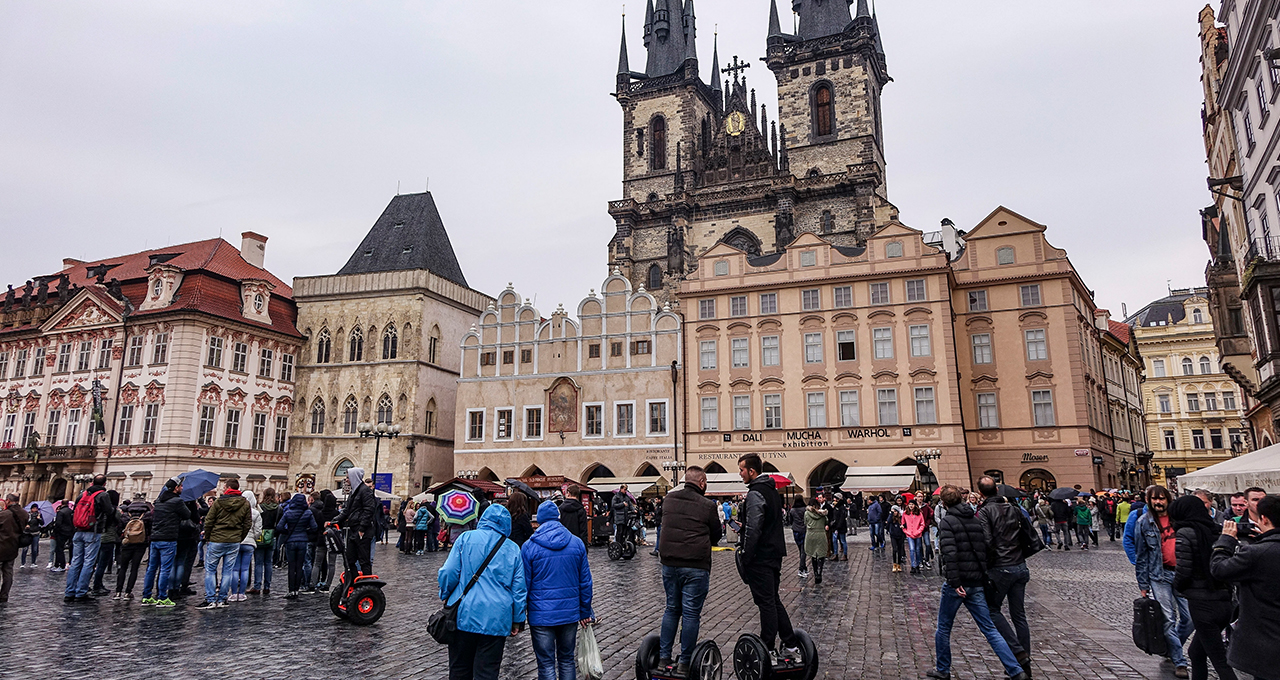
Thirty years ago, a wave of optimism swept across Europe as walls and regimes fell, and long-oppressed publics embraced open societies, open markets and a more united Europe. Three decades later, a new Pew Research Center survey finds that few people in the one-time Eastern Bloc regret the monumental changes of 1989-1991. Yet, neither are they entirely content with their current political or economic circumstances. Indeed, like their Western European counterparts, substantial shares of Central and Eastern European citizens worry near the future on bug like inequality and the functioning of their political systems.
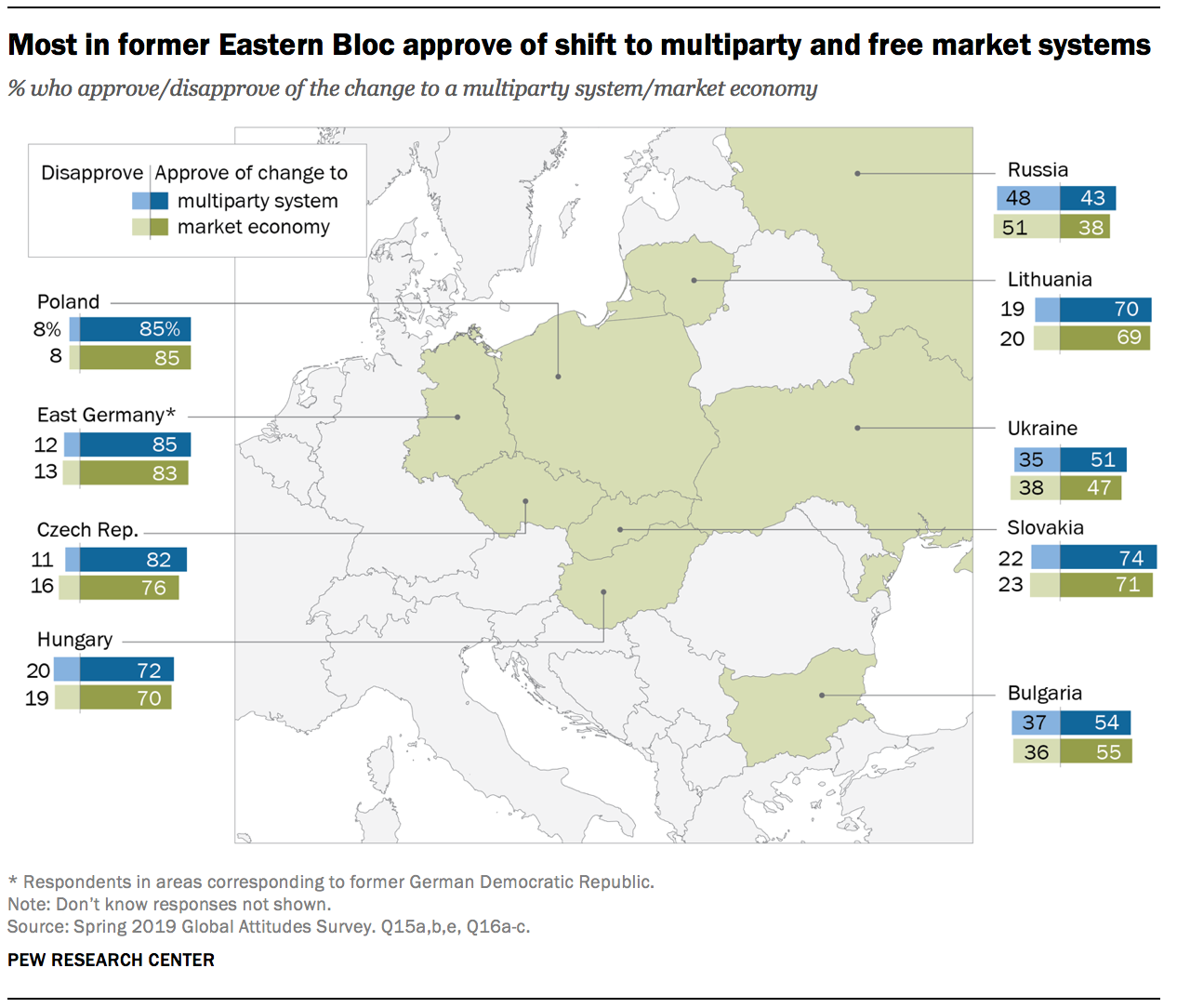
Those in Primal and Eastern European nations that joined the European Union more often than not believe membership has been skilful for their countries, and at that place is widespread support in the region for many democratic values. Nevertheless, fifty-fifty though nearly broadly embrace democracy, the intensity of people's delivery to specific democratic principles is not always strong.
When asked most the shifts to multiparty democracy and a market economy that occurred following the collapse of communism, former Eastern Bloc publics surveyed largely corroborate of these changes. For example, 85% of Poles support the shifts to both democracy and capitalism. Nevertheless, support is not uniform – more than a third of Bulgarians and Ukrainians disapprove, as exercise roughly one-half in Russia.
These questions near democracy and a market economic system were first asked in 1991, and then again in 2009. In a few nations – Hungary, Lithuania and Ukraine – support for both declined between 1991 and 2009 before bouncing back significantly over the past decade. Russian federation is the only country where back up for multiparty democracy and capitalism is down significantly from 2009.
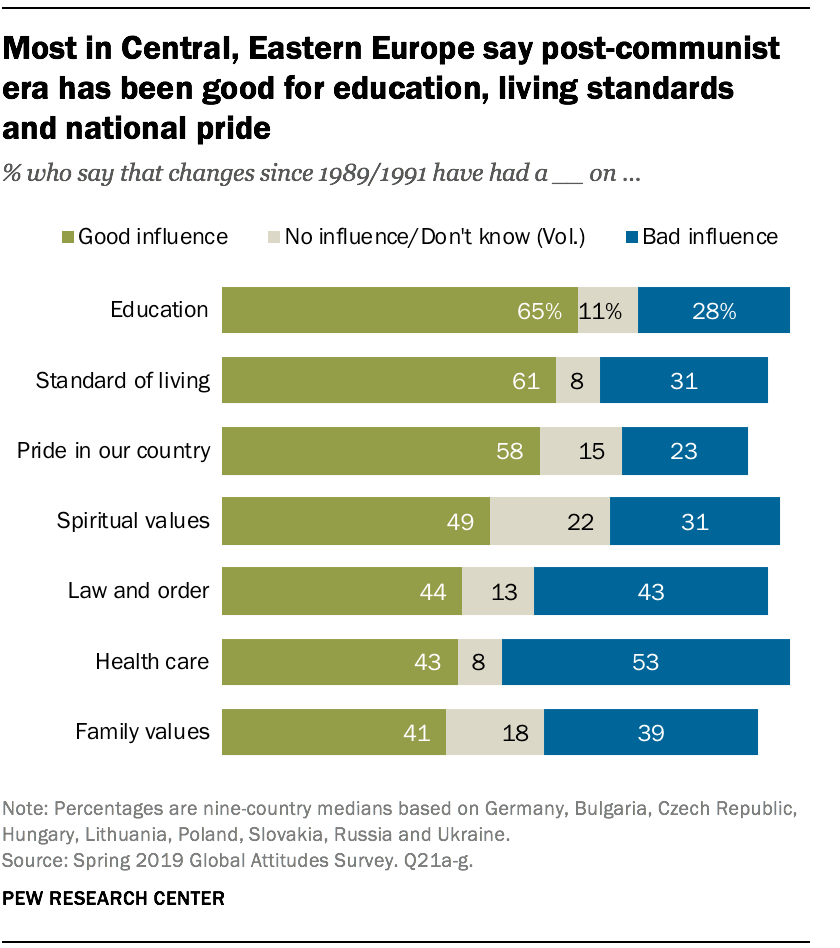 The varying levels of enthusiasm for commonwealth and free markets may be driven in part past unlike perspectives about the caste to which societies accept made progress over the by three decades. Almost Poles, Czechs and Lithuanians, and more than than iv-in-ten Hungarians and Slovaks, believe the economic situation for most people in their country today is improve than it was nether communism. And in these five nations, people are more probable to concur this view now than was the example in 2009, when Europe was struggling with the effects of the global fiscal crisis.
The varying levels of enthusiasm for commonwealth and free markets may be driven in part past unlike perspectives about the caste to which societies accept made progress over the by three decades. Almost Poles, Czechs and Lithuanians, and more than than iv-in-ten Hungarians and Slovaks, believe the economic situation for most people in their country today is improve than it was nether communism. And in these five nations, people are more probable to concur this view now than was the example in 2009, when Europe was struggling with the effects of the global fiscal crisis.
However, in Russia, Ukraine and Bulgaria, more half currently say things are worse for most people now than during the communist era.
When asked whether their countries have fabricated progress over the past iii decades across a range of issues, the Central and Eastern European publics surveyed feel near positive virtually bug like teaching and living standards. Just opinions are more divided about progress on police and guild and family values, and most say the changes accept had a negative bear on on wellness intendance.
In that location is widespread agreement that elites take gained more than from the enormous changes of the past thirty years than average citizens have. Large majorities in all Fundamental and Eastern European nations polled think politicians and business organisation leaders accept benefited, but fewer say this well-nigh ordinary people.
Simply as at that place are different views about the progress nations have fabricated in the contempo past, opinions differ about the futurity also. Across the former communist nations included in the survey, people are relatively optimistic about the hereafter of their country's relations with other European nations, but more often than not pessimistic about the performance of the political system and specific economic issues similar jobs and inequality.
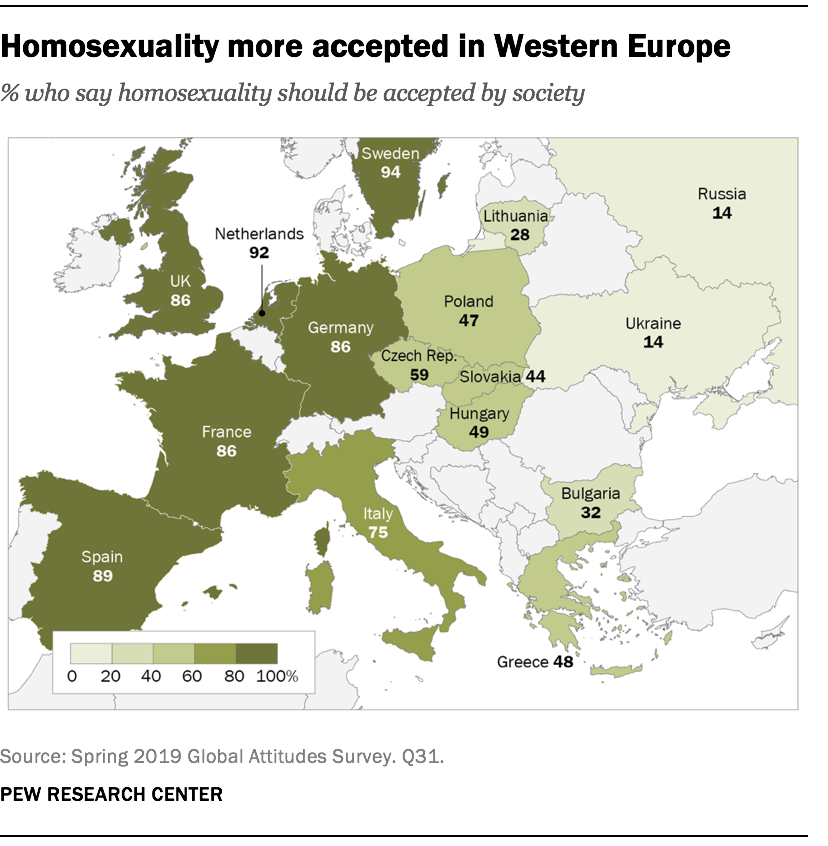 Across Europe, attitudes on some topics reflect a precipitous East-West divide. On social issues like homosexuality and the part of women in society, opinions differ sharply betwixt West and East, with Western Europeans expressing much more progressive attitudes.
Across Europe, attitudes on some topics reflect a precipitous East-West divide. On social issues like homosexuality and the part of women in society, opinions differ sharply betwixt West and East, with Western Europeans expressing much more progressive attitudes.
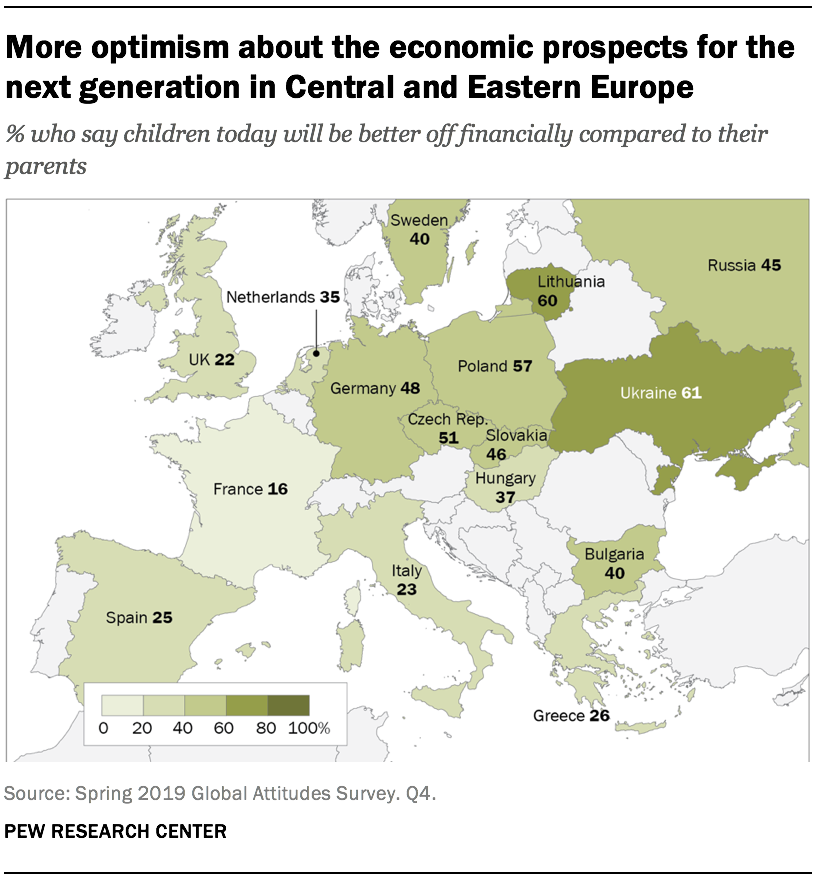 At that place is also a split up on views about the economic time to come. Regarding the economical prospects for the side by side generation, hope is somewhat more mutual in former Eastern Bloc nations. Around half-dozen-in-ten Ukrainians, Poles and Lithuanians believe that when children in their country grow up, they will be financially ameliorate off than their parents. In contrast, roughly a quarter or fewer hold this view in Greece, Spain, Italy, the United Kingdom and France.
At that place is also a split up on views about the economic time to come. Regarding the economical prospects for the side by side generation, hope is somewhat more mutual in former Eastern Bloc nations. Around half-dozen-in-ten Ukrainians, Poles and Lithuanians believe that when children in their country grow up, they will be financially ameliorate off than their parents. In contrast, roughly a quarter or fewer hold this view in Greece, Spain, Italy, the United Kingdom and France.
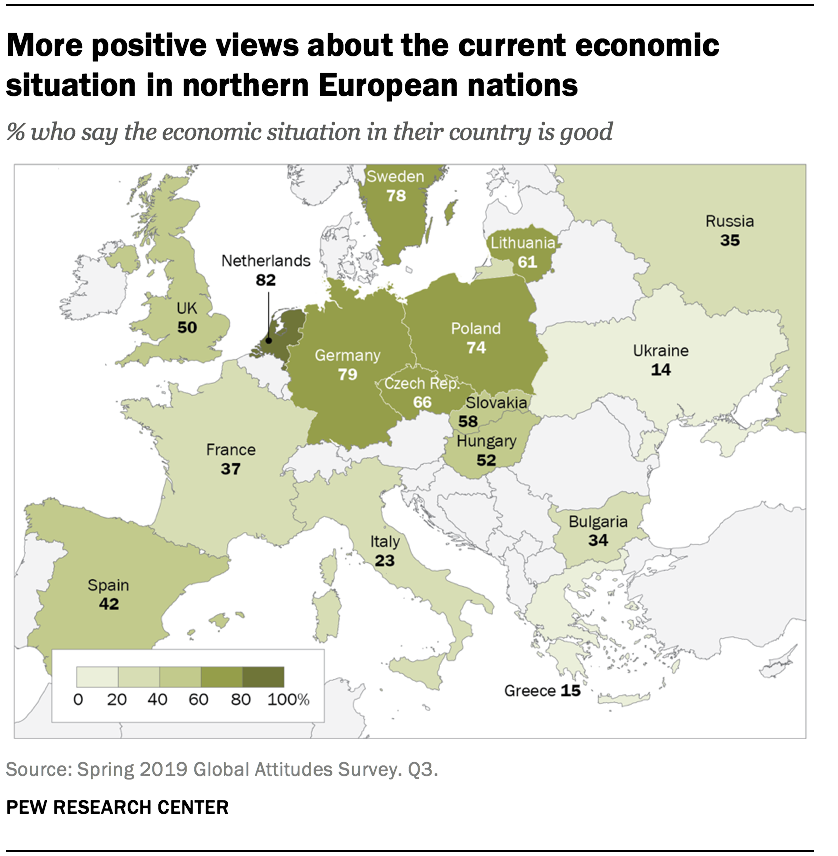 On views about the land of the current economic system, all the same, the primary partitioning is often between a relatively satisfied northern Europe and a mostly unhappy south, where many people have not recovered from the economic crisis of a decade ago.
On views about the land of the current economic system, all the same, the primary partitioning is often between a relatively satisfied northern Europe and a mostly unhappy south, where many people have not recovered from the economic crisis of a decade ago.
European union member states are by and large united in their support for the wide European project. The Eu gets largely favorable ratings, most say membership has been practiced for their countries, and most believe their countries have benefited economically from existence a part of the Eu, although positive reviews for the institution are hardly universal. The most favorable ratings for the EU are institute in onetime communist nations Poland and Lithuania, both of which became fellow member states in 2004.
Every bit previous Pew Inquiry Center studies have shown, Europeans tend to believe in the ethics of the European union, merely they have complaints near how information technology functions. Near take said the European union stands for peace, democracy and prosperity, but most also believe it is intrusive and inefficient and that Brussels does non empathize the needs of average citizens.
The two former communist nations in the survey that have not joined the EU – Russian federation and Ukraine, both of which were part of the Soviet Marriage – look very different from the Eu nations surveyed on a number of measures. They are less approving of the shifts to democracy and capitalism, less supportive of specific autonomous principles and less satisfied with their lives.
These are among the central findings from a new Pew Research Heart survey of 17 countries, including 14 Eu nations, Russia, Ukraine and the Usa. The survey covers a broad assortment of topics, including views about the transition to multiparty politics and free markets, democratic values, the European union, Germany, political leaders, life satisfaction, economic conditions, gender equality, minority groups and political parties.
The survey was conducted amid 18,979 people from May 13 to Aug. 12, 2019. This report builds upon two previous surveys by Pew Research Center and its predecessor. The first was conducted by the Times Mirror Center for the People & the Printing (a precursor of Pew Inquiry Heart) from April fifteen to May 31, 1991. The second was a poll conducted past Pew Research Center from Aug. 27 through Sept. 24, 2009, simply prior to the 20th anniversary of the fall of the Berlin Wall.
The 1991 survey took identify prior to the dissolution of both Czechoslovakia and the Soviet Union. Even though Czechoslovakia was a single state in 1991, we show 1991 results for geographic areas that stand for to the nowadays-24-hour interval Czech Commonwealth and Slovakia. In 1991, Lithuania, Russia and Ukraine were surveyed as republics of the Soviet Union. In Ukraine in 2019, we practise not survey in Crimea or areas under conflict in the eastern oblasts of Luhansk and Donetsk. For more information, come across the Methodology.
About Europeans support democratic values, merely many worry well-nigh how commonwealth is working
Beyond all 14 EU countries included in the written report, as well Russian federation, Ukraine and the United States, there is wide support for specific democratic rights and institutions. Respondents were presented with nine different features of liberal democracy, then asked how of import it is to have each i in their country. Majorities in every nation polled said all of these ix factors are at least somewhatof import, and in virtually countries, large majorities expressed this view.
However, attitudes differ regarding whether these principles are very important. Large majorities typically consider having a off-white judicial arrangement and gender equality very of import, but back up for religious freedom and assuasive civil order groups to operate freely is in some cases less enthusiastic.
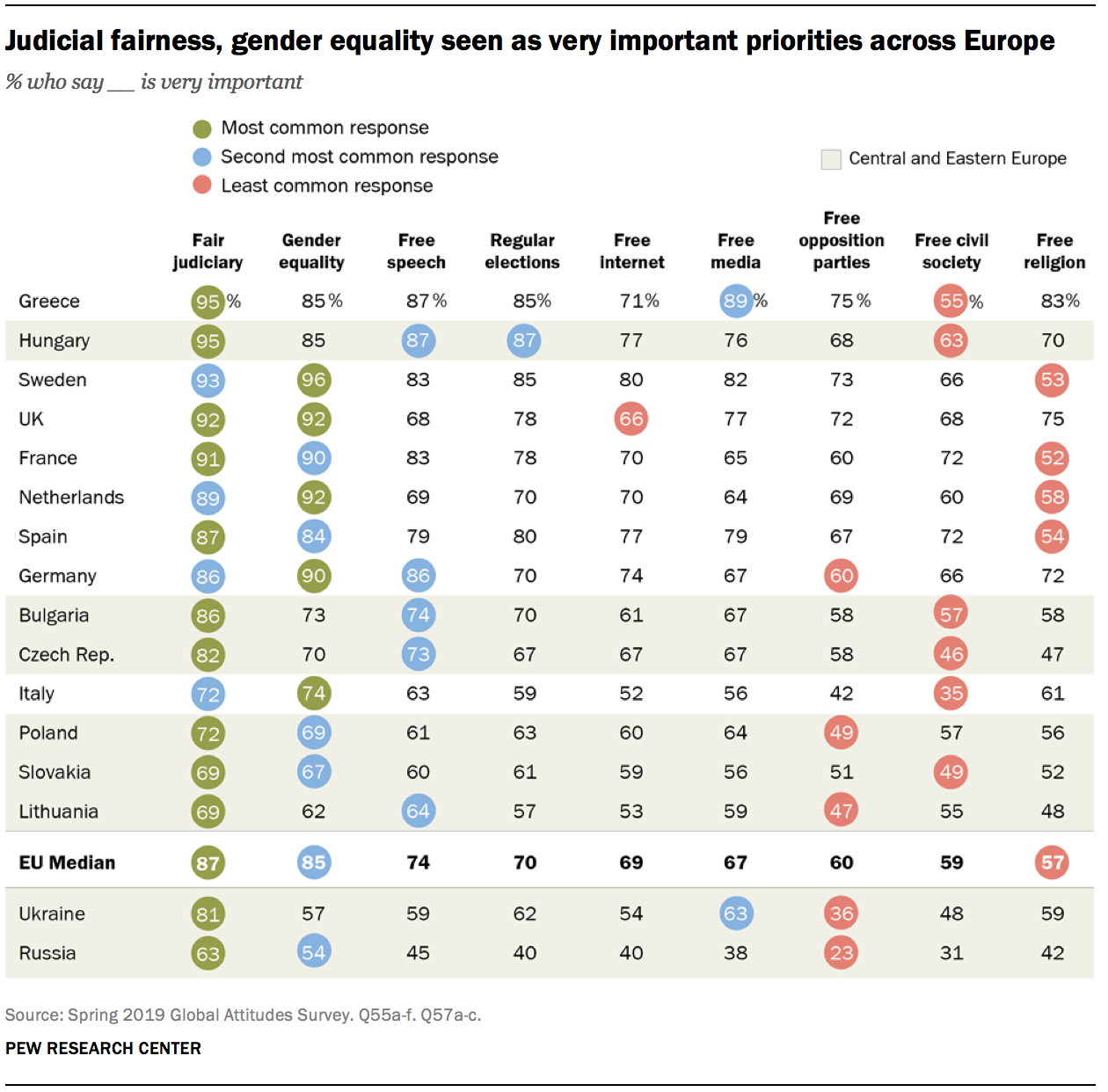
And there are notable differences beyond countries. Western Europeans are generally more than likely than Central and Eastern Europeans to rate these rights and institutions every bit very of import. Russians consistently express the everyman levels of support. Americans, meanwhile, are frequently particularly likely to consider these principles very important.
This is consistent with other Pew Research Centre surveys, which take institute that while democracy is a popular idea effectually the globe, the intensity of people's commitment to it is not always strong. For case, representative republic is widely embraced, but significant shares of the public in many nations are open to nondemocratic forms of government as well. People back up free expression, but there are stiff differences across nations regarding the advisable boundaries of permissible speech. And, as the current survey shows, fundamental democratic rights and institutions are widely embraced, just some requite those principles a less than full-throated endorsement.
In that location are also large cantankerous-national differences on how people view the electric current state of republic in their country. In Sweden, the Netherlands, Poland and Germany, 65% or more are satisfied with the way democracy is working, while in Hellenic republic, Bulgaria, the U.k., Italy and Spain two-thirds or more than are dissatisfied.
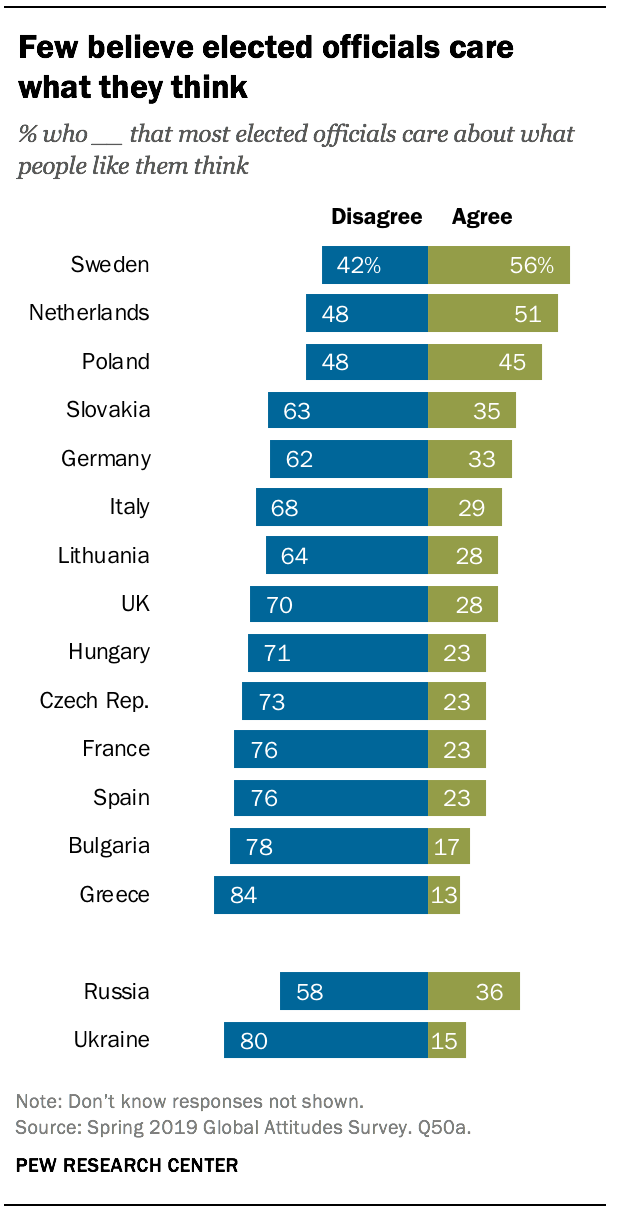 Ane gene driving dissatisfaction with the way democracy is working is frustration with political elites, who are often perceived every bit out of impact with average citizens. Across the Eu nations polled, a median of 69% disagree with the statement "Nearly elected officials care nigh what people like me think." Majorities also share this perspective in Russian federation, Ukraine and the U.S.
Ane gene driving dissatisfaction with the way democracy is working is frustration with political elites, who are often perceived every bit out of impact with average citizens. Across the Eu nations polled, a median of 69% disagree with the statement "Nearly elected officials care nigh what people like me think." Majorities also share this perspective in Russian federation, Ukraine and the U.S.
In former Eastern Bloc nations, there is a widespread perception that politicians – and to a somewhat lesser extent, business people – accept benefited profoundly from the changes that accept taken identify since the end of the communist era. The belief that ordinary people have benefited is much less common, although the share of the public expressing this view has increased in many countries since 2009.
Another sign of frustration with political elites and institutions is the poor ratings for most European political parties. The survey asked respondents whether they have a favorable or unfavorable opinion of major parties in their country. In full, we asked nearly 59 parties across the 14 EU nations surveyed – but only half dozen of these parties receive a favorable rating from half or more than of the public.
Despite the misgivings many have about the mode commonwealth is working, almost still believe they can have an influence on the management of their country. In every nation surveyed, roughly half or more than hold with the statement "Voting gives people like me some say well-nigh how the government runs things." And nigh seven-in-ten or more express this view in Espana, Sweden, Slovakia, Ukraine, the Czech Republic and Poland, as well as in the U.Due south.
More often than not positive attitudes toward the EU
I of the nigh significant political developments of the past iii decades has been the integration of many Key and Eastern European nations into the Eu. Of grade, another major evolution in contempo years has been the rise of populist political parties and movements throughout Europe that have questioned the value of European integration and railed confronting Brussels on a variety of fronts. The U.k. has gone so far as to vote to leave the European union.
Overall, attitudes toward the EU are positive. Roughly half or more than in every member state surveyed express a favorable opinion of the institution. The EU gets its highest ratings in Poland and Lithuania, two nations that did not join the spousal relationship until 2004, and its third highest rating is in Bulgaria, which didn't join until 2007. In the UK, Hellenic republic, Czechia and France, attitudes toward the Eu are less positive, though still on balance favorable.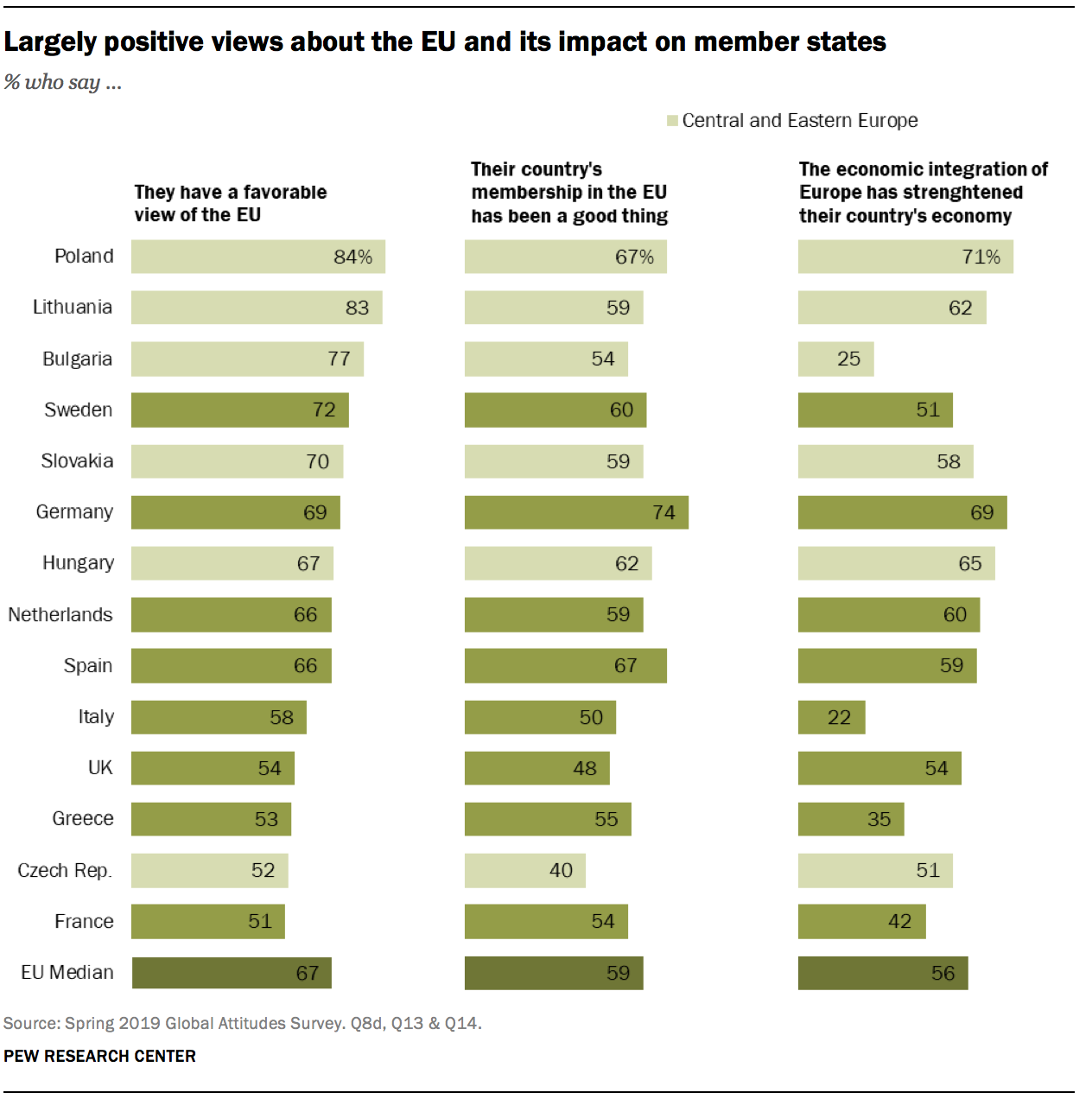
When asked to reverberate on their country's EU membership, respondents more often than not say information technology has been a good thing, especially in Deutschland, Poland and Spain, where at least two-in-three express this view. In contrast, only half or fewer believe membership has been good in Italy, the UK and the Czech republic.
Publics are somewhat more than lukewarm about the economic bear on of Eu membership. When asked whether the economical integration of Europe has strengthened or weakened their country's economy, a median of 56% across the 14 fellow member states surveyed say information technology has strengthened it. Notwithstanding, just 42% in French republic, 35% in Greece, 25% in Bulgaria and 22% in Italy share this opinion.
Overall, views about the full general impact of European union membership, and the specific economical bear upon of membership, have improved in recent years as economic concerns accept eased somewhat in many nations. Even, for instance, in a state like France, where in that location is yet a lot of skepticism virtually the value of economical integration, opinions accept improved – in 2015, only 31% felt integration had helped their economy, compared with the 42% registered in the electric current survey.
Life satisfaction is upwardly significantly over the past 3 decades
Amidst the survey'south most positive findings is that people in onetime communist nations, as well every bit in Western Europe and the United States, are feeling better about their own lives than was the case when these countries were surveyed in 1991. The improvement in several of the Primal and Eastern European countries that take joined the EU is dramatic. In 1991, as Poland was yet coming to grips with the transition to democracy and commercialism, just 12% of Poles rated their lives a vii, viii, 9 or 10 on a 0-10 scale, where 10 represents the best possible life and 0 the worst possible life. Today, 56% practise and so.
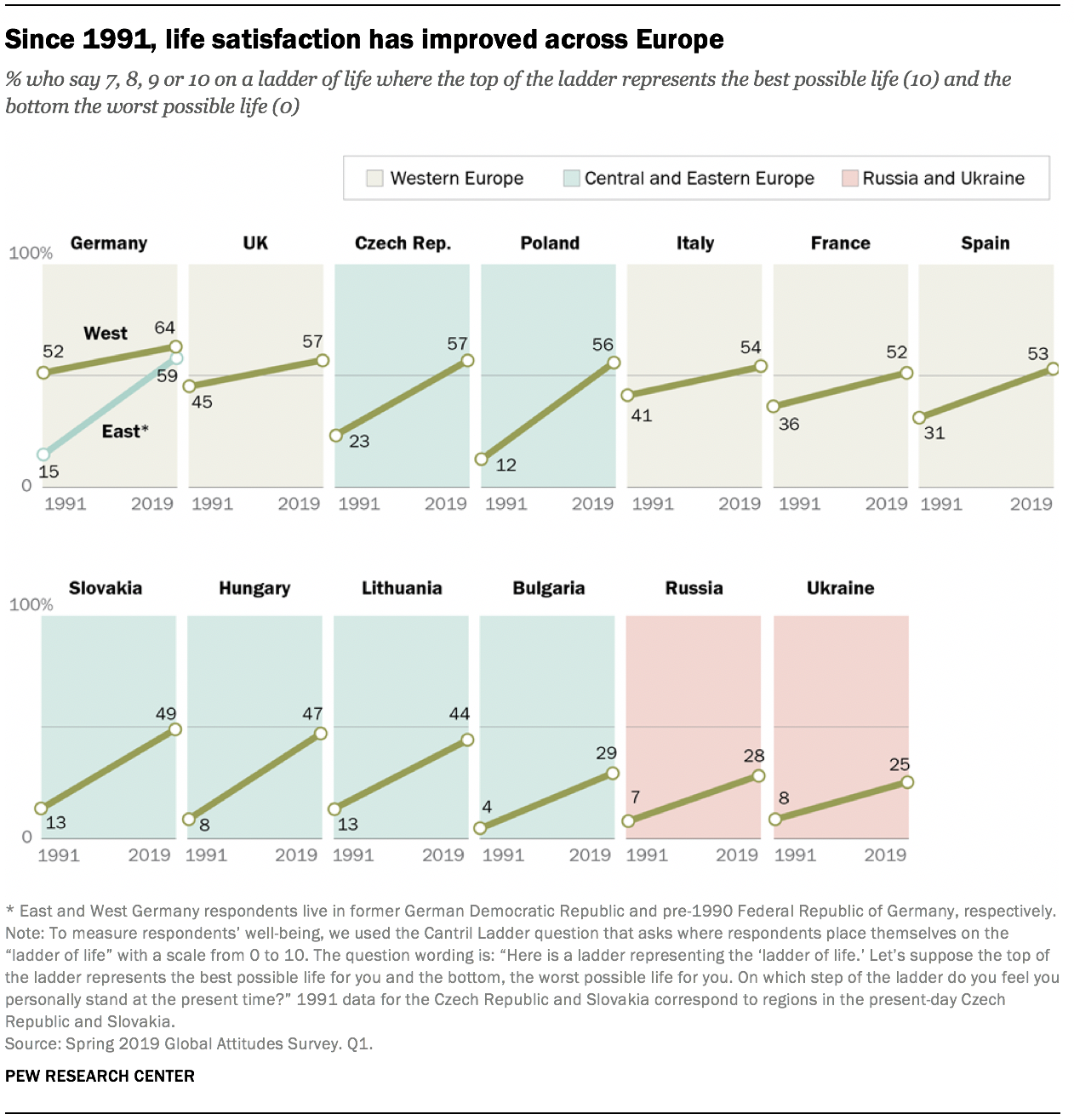
However, improvements are not limited to the sometime Eastern Bloc. Fifty-fifty though their countries have experienced economic challenges in contempo years, people in France and Espana are much more positive nigh their lives than they were virtually 3 decades ago.
Overall, life satisfaction tends to be higher in wealthier nations. The four countries with the highest per capita incomes in this study – the U.Southward., the Netherlands, Germany and Sweden – also have the highest levels of life satisfaction, while the nation with the everyman per capita income, Ukraine, has the lowest level.
Europeans are both hopeful and apprehensive most the hereafter
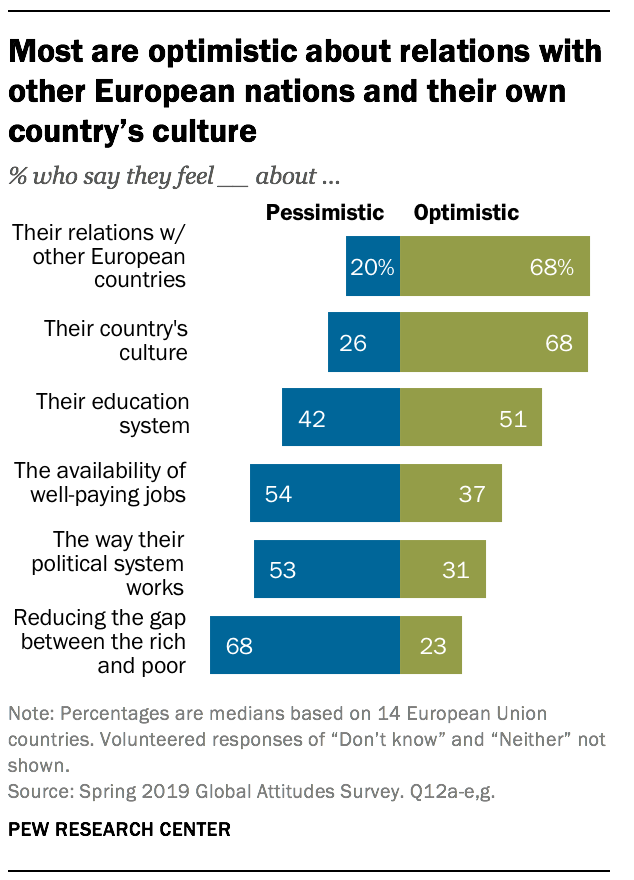 When thinking about the future of their countries, Europeans limited a mixture of optimism and pessimism. Regarding the economic prospects for the adjacent generation, hope is more common in Central and Eastern Europe. Around six-in-10 Ukrainians, Poles and Slovaks believe that when children in their country grow upward, they will be financially better off than their parents. In contrast, roughly a quarter or fewer hold this view in Greece, Spain, Italia, the Uk and France.
When thinking about the future of their countries, Europeans limited a mixture of optimism and pessimism. Regarding the economic prospects for the adjacent generation, hope is more common in Central and Eastern Europe. Around six-in-10 Ukrainians, Poles and Slovaks believe that when children in their country grow upward, they will be financially better off than their parents. In contrast, roughly a quarter or fewer hold this view in Greece, Spain, Italia, the Uk and France.
When asked how they feel about the future of dissimilar topics in their countries, opinions vary widely across issues. People are largely optimistic well-nigh the future of their state's relations with other European nations, and they feel the same way about their country's culture. However, in that location is considerably less optimism near the hereafter regarding well-paying jobs and the style the political system works. European publics are specially pessimistic almost reducing economic inequality – beyond the 14 EU nations surveyed, a median of just 23% are optimistic virtually reducing the gap between rich and poor in their land.
More optimism among young people
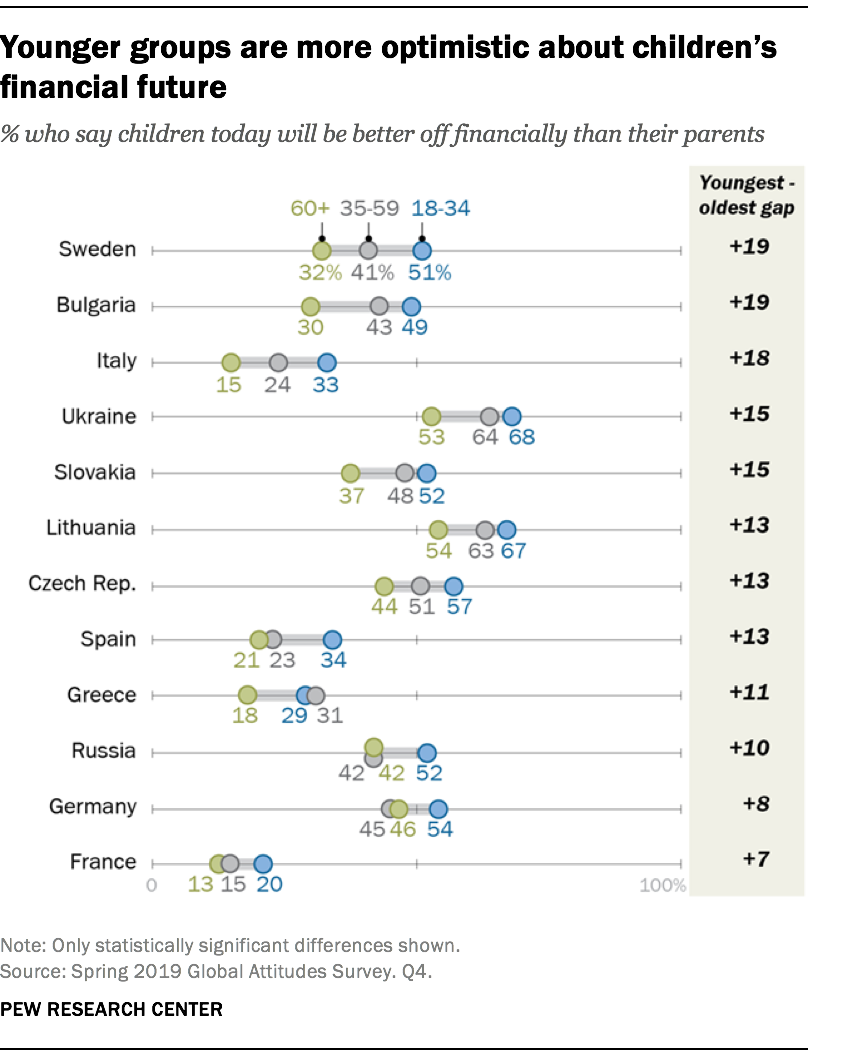 On a host of issues, young people have a relatively positive outlook about the past, present and future of their countries. In one-time communist nations, eighteen- to 34-year-olds are generally more than likely than their older counterparts to believe the shift to a marketplace economic system has been good for their country, and they are also more likely to call up the changes that have taken place over the past three decades take benefited ordinary people.
On a host of issues, young people have a relatively positive outlook about the past, present and future of their countries. In one-time communist nations, eighteen- to 34-year-olds are generally more than likely than their older counterparts to believe the shift to a marketplace economic system has been good for their country, and they are also more likely to call up the changes that have taken place over the past three decades take benefited ordinary people.
Across many European countries, those under 35 are more satisfied with the current direction of their countries. They also express more favorable opinions of the EU, more positive attitudes toward Muslims and are more than accepting of homosexuality.
And there is greater optimism about the long-term economical futurity among young people. In 12 nations, those ages xviii to 34 are more likely than those 60 and older to believe that children in their country volition be better off financially than their parents when they grow upwards.
Perceptions of gender equality
 Although Europeans tend to place a high priority on having gender equality in their countries, in several nations women are more likely than men to concord this view. In nine of the nations surveyed, women are especially likely to say it is veryimportant that women have the same rights equally men in their land. Double-digit gender gaps on this question are found in Slovakia, Italy, Bulgaria, Lithuania, Russian federation, Hungary and the Czechia.
Although Europeans tend to place a high priority on having gender equality in their countries, in several nations women are more likely than men to concord this view. In nine of the nations surveyed, women are especially likely to say it is veryimportant that women have the same rights equally men in their land. Double-digit gender gaps on this question are found in Slovakia, Italy, Bulgaria, Lithuania, Russian federation, Hungary and the Czechia.
In many European nations, attitudes toward gender roles and wedlock have shifted since 1991, with more people at present preferring a marriage where both the married man and married woman have jobs and take care of the household, rather than one where the husband provides for the family unit and the married woman takes care of abode and children. For instance, in 1991, 57% of Poles preferred traditional marriage roles, compared with just 27% today.
When it comes to gender and the economical sphere, majorities in most countries disagree with the argument "When jobs are deficient, men should take more correct to a job than women." All the same, substantial shares of the public hold with this statement in several nations, including roughly half dozen-in-x in Slovakia and 4-in-x or more in Greece, Poland, Bulgaria and Italy.
Right-wing populists more distrustful of EU, minorities
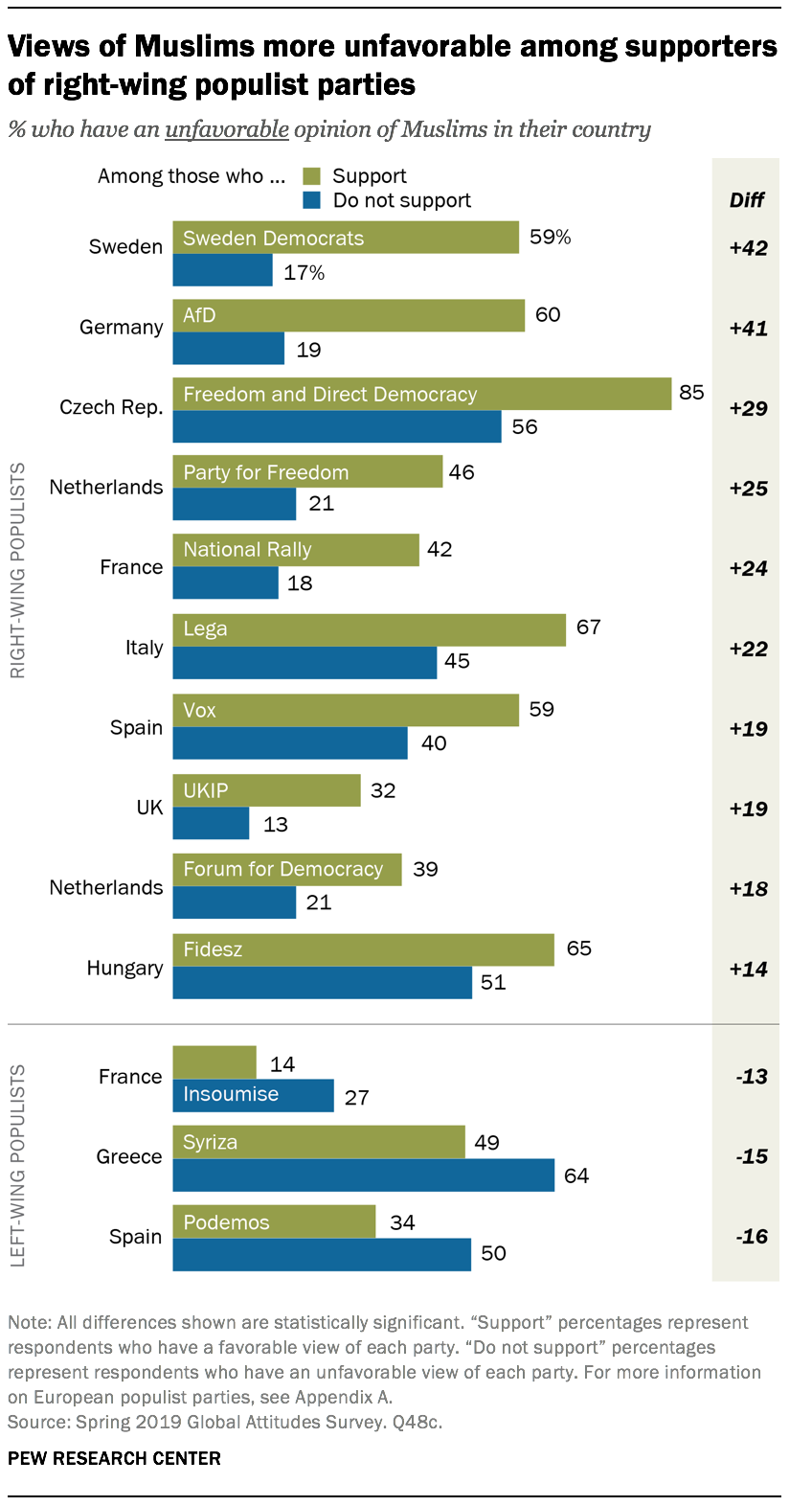 Political systems in Europe and elsewhere have been disrupted over the past few years by the growth of anti-aristocracy sentiments and the rise of populist parties, leaders and movements – more often than not, just not exclusively, on the political right. Numerous bug accept fueled the spread of populism, and the current survey highlights a diverseness of topics where supporters of populist parties stand out.
Political systems in Europe and elsewhere have been disrupted over the past few years by the growth of anti-aristocracy sentiments and the rise of populist parties, leaders and movements – more often than not, just not exclusively, on the political right. Numerous bug accept fueled the spread of populism, and the current survey highlights a diverseness of topics where supporters of populist parties stand out.
People who express a favorable opinion of right-wing populist parties are generally more likely to concur unfavorable views of the EU and to believe the economic integration of Europe has been bad for their countries. For more on how this survey defines populist parties in Europe, run across Appendix A.
They are too less accepting of homosexuality and more than negative toward minority groups. For example, 59% of Swedes with a positive stance of the correct-wing populist Sweden Democrats express an unfavorable stance of Muslims in their country; amid those with a negative view of the Sweden Democrats, but 17% see Muslims negatively. How people feel about right-fly populist parties also shapes attitudes toward Muslims in Germany, the Czech Democracy, the Netherlands, France, Italy, Spain, the UK and Hungary.
A unlike pattern emerges, however, regarding left-fly populist parties. In French republic, Hellenic republic and Spain, people with favorable views of left-wing populist parties tend to take more positive attitudes toward Muslims in their country.
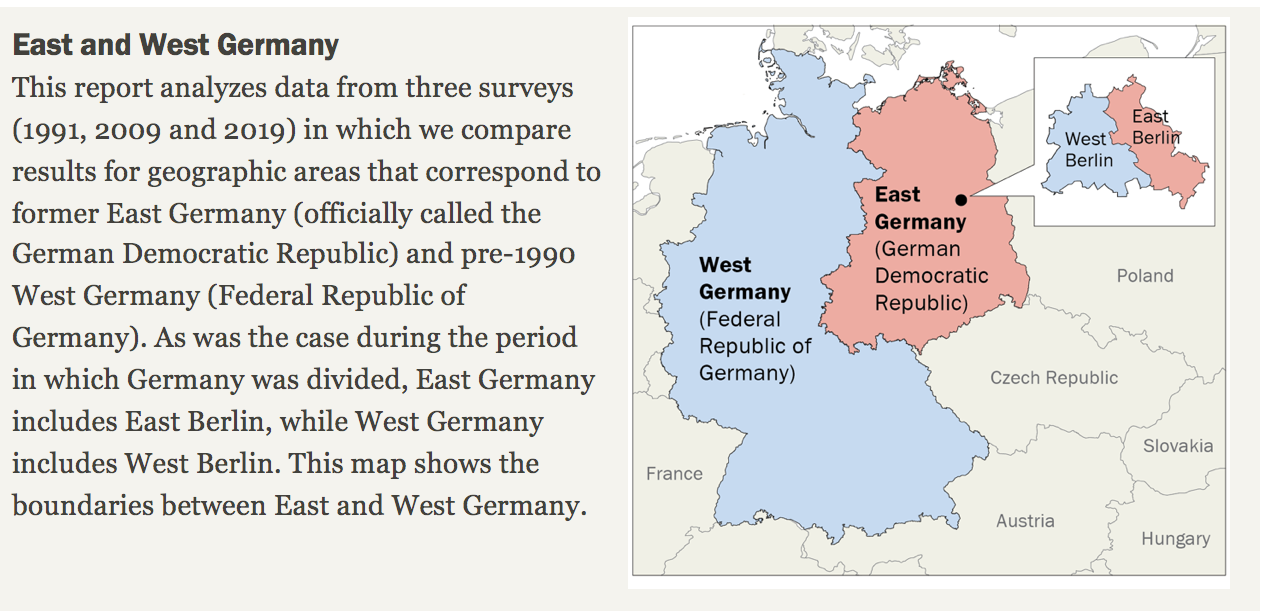
State Spotlights:
Germany
The survey has sure questions that were asked only in former E Germany, and on many other questions there are substantial differences betwixt those Germans living in the East and the West.
- Around 9-in-10 Germans living in both the West and Eastward say that German unification was a good thing for Germany. All the same, majorities on both sides of the one-time Iron Mantle say that since unification, East and W have not accomplished the aforementioned standard of living.
- Due east Germans are less satisfied with the way democracy is working in Germany and the overall management of the country than those in the West. And fewer Eastward Germans accept a favorable view of the European Union.
- Life satisfaction in East Germany has skyrocketed since 1991 and at present is endmost in on opinions in the West. In 1991, 15% of those living in erstwhile East Frg said their life was a 7, viii, nine, or 10 on a 0-10 scale, merely in 2019 that ballooned to 59%. Meanwhile, life satisfaction in the West has too increased since 1991, from 52% to 64% today.
United States
While American and European attitudes are similar on some key issues, there are others where the two sides of the Atlantic take less in common.
- Americans are more likely than Europeans to say most tenets of democracy are very of import for the country, only peculiarly the ability for the media to written report without government censorship and freedom of religion. Americans are about as probable as Western Europeans to say that honest, regular elections with at to the lowest degree 2 parties are very important for their country, and both see this as more important than most in Eastern Europe.
- When it comes to attitudes about LGBT rights, Americans are generally more than progressive than Cardinal and Eastern Europeans. For case, today 72% of Americans say homosexuality should be accustomed by society. While lower than the median of 86% in Western Europe, this is much higher than the median of 46% who say the aforementioned in Central and Eastern Europe.
- Regarding attitudes about individualism, Americans are less likely than Europeans to say forces outside of people's control determine success in life.
Roadmap to the report
The chapters that follow discuss these findings and others in more than detail:
- Chapter ane examines attitudes in Central and Eastern Europe toward the political and economic changes that occurred post-obit the fall of communism as well equally how these changes have influenced different groups and aspects of club.
- Chapter 2 explores the democratic institutions and rights that people across Europe view as important for their country.
- Chapter three looks at satisfaction with the way democracy is working, including whether voting gives people a say in what happens in their country.
- Chapter 4 reviews attitudes toward the European union and major European leaders, and examines people'southward optimism, or pessimism, about various aspects of their society.
- Affiliate 5 explores national weather condition, such every bit views about the current economic situation, as well every bit life satisfaction.
- Chapter vi considers European attitudes toward minority groups such as Muslims, Jews and Roma.
- Affiliate seven reviews beliefs about gender equality in order, wedlock and employment.
- Chapter eight examines ratings of European political parties.
Source: https://www.pewresearch.org/global/2019/10/15/european-public-opinion-three-decades-after-the-fall-of-communism/